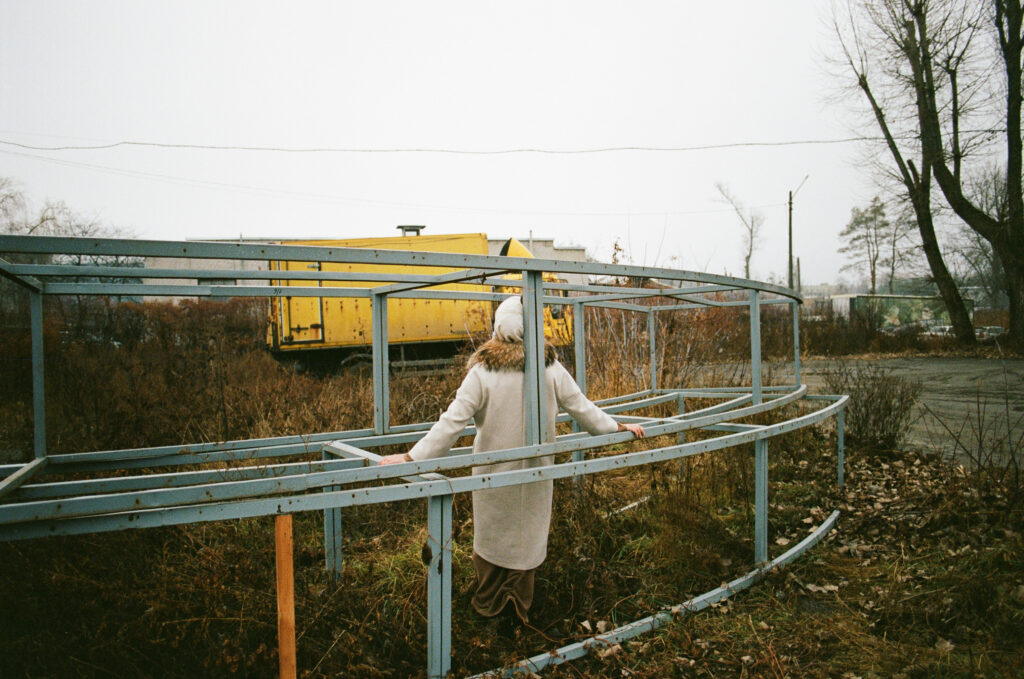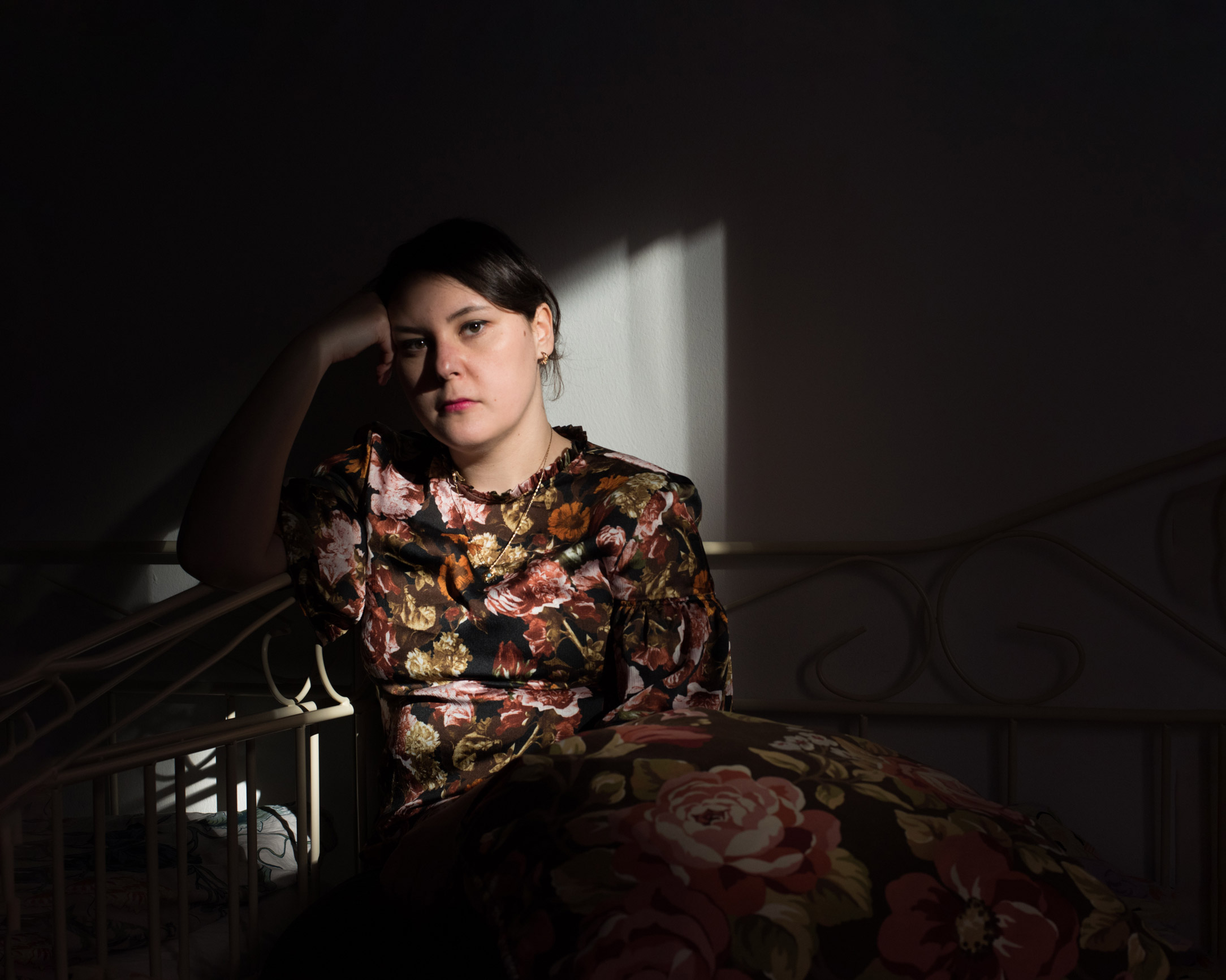Mumine Saliyeva, wife of a political prisoner Seyran Saliyev, coordinator of the Crimean Childhood organization, activist of the Crimean Solidarity.
AND ONE DAY WE SAW THE “GREEN MEN”
From the first days of the Russian occupation of the peninsula, security forces have been conducting mass searches of the homes of the Crimean Tatar people. During these seven years, 233 criminal prosecutions have been recorded, most of them involving Crimean Tatars.
Mumine Saliyeva talks about intergenerational connections, returning to the Crimea after the 1944 deportation, fabricated accusations and how to find strength to love and support in this situation.
On connection between generations
Everyone’s path begins with the first step. And what I do today, my activist work, my views, my principles — their foundations lie in the distant past.
Everyone in our family was a religious figure. Men we imams — my grandfather, and great-grandfather. Imams’ work is in their community, they explain religion to people, tell them how to solve problems, and call them for Friday prayers. There were also many doctors both from my father’s and my mother’s side.
My parents are very good noble people and they received a good upbringing. They represent the generation that was born in deportation after 1944.
In our family, both mom and dad always said, “Knowledge is the greatest wealth.” In Crimean Tatar language there is even a proverb of the same meaning. About this most significant asset.
On moving to the Crimea after the deportation
We moved to the Crimea in the 90s. My brother and I were very little and did not understand why we had to leave everything and move somewhere else. It was a lot of stress, but that’s how we were brought up: “If Dad says you have to do it, it’s the law. That’s the right thing.” So we flew to the Crimea by plane, and arrived at the Belogorsk area, the village of Aromatne.
It was a wasteland with houses built in the late 18th century. So we enter the house, and there are no floors, no ceilings, walls have huge cracks, there’s an old stove and springed beds, like in hospitals. And it’s very cold.

Dad and Mom gradually began to equip it with basic necessities. We didn’t bring many belongings. Several carpets in the Crimean Tatar style, some dishes and pillows.
Thus began our life in the Crimea. A few months later, my father got a job as a security guard at the school. He also had to heat it. Mom worked as a cleaner. I did not speak any Russian. And I remember how difficult it was during those first years, when you were ridiculed, when you had no friends or acquaintances who would understand.
Returning as a collective decision
At the heart of the processes that took place in the early 1990s was the collective decision of the entire nation. This can be seen in the statistics, in the archives – not just individual families were moving, but entire villages. It was not easy. Grandpa said, “Don’t expect they’ve been waiting for us here.” Everything that belonged to the people by law, by right, had to be fought for with great effort.
And when people finally got on their feet, so to say, and rejoiced in returning home, in a few days suddenly everything changed again.
When the world turned upside down again
People woke up one day and saw the “green men”: the military without insignia. Tanks appeared on the streets, dozens of armed men took control of the Verkhovna Rada building. And at the same time there were no official comments on what was happening. But the elderly were the first to realize that a de facto new government had arrived.
They already felt, on a genetic level, what kind of government it was, because the first annexation of Crimea took place in 1783. And they understood that Russia is the successor to all this. And at this genetic level, they realized who they were dealing with. Therefore, many of them simply died of heart attacks. Dozens more people were hospitalized. Because the 1944 deportation and all the previous repressions in the history of the Crimean Tatars – all these episodes seemed to be repeating themselves.
On March 3, 2014, Ametov, a Crimean Tatar, went out to the square in a one-man protest. There are videos of him being led to a car by three people of this specific type, we all know which. Two weeks later, on March 15, he was found dead. But what they found was not a body, but a mutilated corpse. His eyes were pierced, a bag on his head, handcuff marks on his hands. Crimean human rights activists saw this as an act of intimidation of the entire nation.
Then the first searches began, the first families who lost their men, and the first Sevastopol Hizb ut-Tahrir group. Later the picture became clearer, especially when professional media were simply kicked out of the Crimea and independent journalists were not allowed to work in the Crimea anymore.
It became clear that this was not a temporary change for a year or two. This was a long-term situation.
Sharing experiences
In 2014, when all these geopolitical transformations began, the greatest psychological blow fell on the elder people, because the younger generation was not yet able to give an accurate assessment of what was happening, or to make any predictions.
But it was an unfair war, when a steamroller of repressions is moving at you, and you have nothing to retaliate with but words. Throughout the history of our people, our main weapons have been words. And we are grateful to our elders, who still share their experience with us.
The events of 1937-1938 resonate with today, only the details are somewhat different. Then my great-grandfather was executed, and a little later my grandmother with her children were evicted in 1944. But she, like many other women who were now alone, kept singing a song of how hopes and dreams do not die. That the day will come and by the will of the Almighty they will return to the Crimea. Just before the verdict that my husband received last year, he also sang this song. Because today, like his ancestors, he is not in the Crimea anymore.
On meeting Seyran
None of those who knew both me and Seyran would probably have ever believed that we would be married and have children. We are completely different! I was very serious, with a huge interest in science, in knowledge. And he is the embodiment of soul. He sings and dances, but also professes Islam.
When he came up to me for the first time, it was so awkward! Not my type of a man at all. He introduced himself and said that if I needed help, he would always be there. And I looked at him and thought: what could I ever need from him? But still thanked him coldly.
But the more we crossed paths, the more I felt that this was my type of a person. He had such an inner core that I understood: this man will always have his own strong position, and I will be able to rely on him.

When after the wedding I saw on ultrasound that we would have a son, I was upset. I really wanted a girl. But Seyran was so happy. He said: accept the gift of the Lord Above with great joy, because even if we cannot see the blessing of it now, the time will come and you will definitely see. Now I remember his words every day.
We couldn’t even begin to think that we would get involved in citizen journalism, that we would monitor all these searches, arrests, and face the fact that our children might be orphaned with their parents still alive.
Persecutions
Initially, there were administrative fines, and interestingly only for those actions for which actually there was no law. There is no article to allow persecutions for journalistic activities or for human rights work. But they needed a reason why people could easily be persecuted solely for their activism, their religious or political stance. And at first there were fines, but in 2017 first administrative arrests began.
Arrest as it was
On October 11 there was a knock at the door. A sharp one, a very telling knock. And then our daughter screamed. She was standing next to Seyran, and when the door burst in, she was thrown into the wall by the wave. I hear that scream, other children wake up, they also start screaming. I immediately get dressed, run out, and see my husband on the floor in handcuffs, barely even allowed to lift his head and already a bruise on his forehead.
There are people around him wearing masks and holding battle rifles. Only one was without a mask, so I realized he was an investigator. I asked him what was going on? Why is my husband on the floor in handcuffs? We are not the kind of people to put up with this, I know your laws very well. I will now start recording your every illegal step, your every offense.
He then ordered the handcuffs to be removed, and read out the order. I knew already that this would be a criminal case, because he read out the names of people whose homes had been searched in Bakhchisarai that day. Article 205.5 – participation or organization of terrorist activities. At that time there were already dozens of cases under this article.
There are now more than 80 criminal cases on Hizb ut-Tahrir and others. And they are all identical – during all the searches they found no explosives, no weapons, nothing.
A date in solitary confinement
Month after month we were trying to get permission for a visit. But we only received it a year and a half later. My daughter, who was 5 at the time, and I went to see him.
I still remember how difficult it was for me to find myself in that closet of a room, the kind of which I only ever saw in movies. With a phone, and this double glass covered in spiderwebs on the inside.
This atmosphere crushed me. Seyran saw that I had a lump in my throat, I couldn’t speak. And our daughter kept drawing him little hearts on the glass with her fingers.
And when my husband saw how hard it was for me, he acted very wisely. He said: do you want me to sing to you? I nodded, and he began to sing the song “Streets of Bakhchysarai.” It says that life is like a caravan. The streets of Bakhchysarai remain before your eyes and in your memory day and night. We were only given an hour and a half that day.
What’s next?
And then he was taken under a convoy from the Crimea to Rostov-on-Don, because the cases of dangerous criminals should be considered exclusively by military courts, not civilian ones.

Such forced convoys outside the Crimea, both prisoners themselves and many others call deportations. And according to international law, in particular the Geneva Convention, such actions are illegal, and therefore there is public outcry against such convoys.
Last December, I received a diploma with distinctions as a Master of International Journalism, and by September I already had a press card. So I was granted my request to take photos and videos in the courtroom, and this was the first time I could see my husband at a distance of two meters. This has been the closest in recent years.
the author of the article: Oksana Hrushanska-Vlasova
photo: Ksenya Kravtsova




